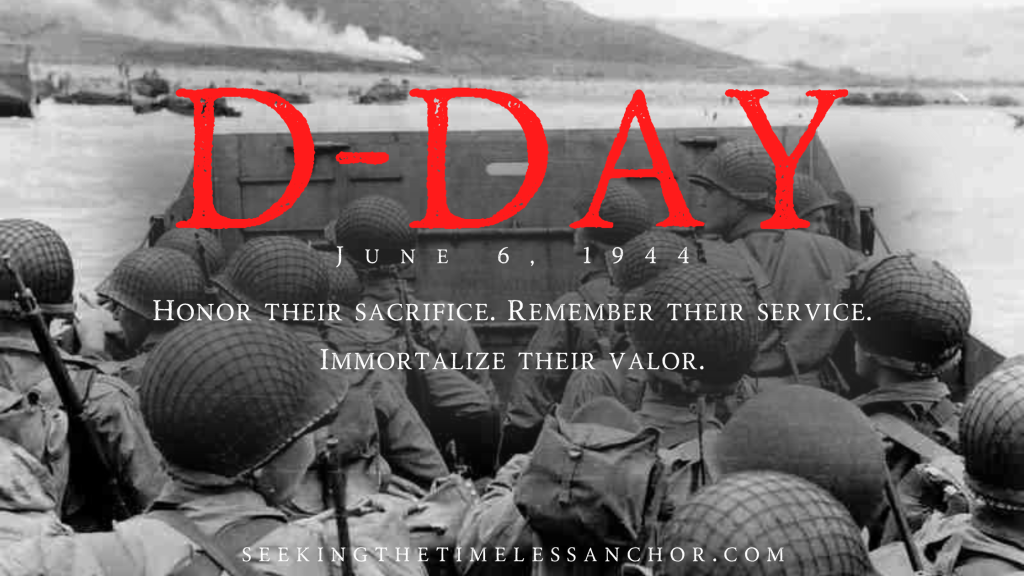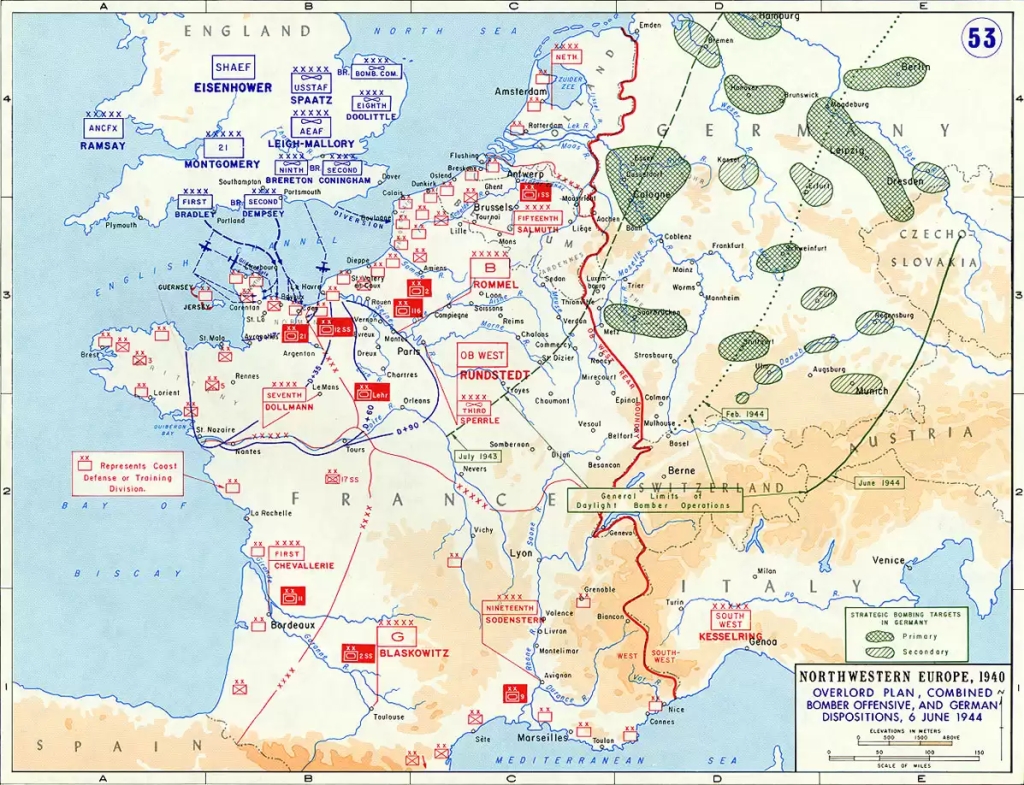As you might have imagined, months of strategy and planning went into D-Day.
In fact, America wanted to invade France as soon as we joined the war in 1941. Great Britain opposed the plan, however. They insisted that the Allies take a more indirect route to Europe, via North Africa and Italy.

America reluctantly agreed and the rest, as they say, is history. But even while the campaigns in Africa and Italy were raging, plans were being formed for the invasion of Fortress Europe.
It was not an endeavor embarked upon lightly, and it was vital that everything fit together perfectly.
Choosing A Commander

From the start, the invasion was planned to be a joint operation with the allied forces. The nations providing the brunt of the force would be America, Canada, and England.
Initially there was some debate as to who would be commanding the invasion. The British felt, seeing as they had been fighting Germany the longest, it should’ve been one of their generals heading it up. The American command felt that it was ridiculous to have a British general in charge when the greater majority of men involved were Americans.
What it boiled down to in the end was finding a man who would be able to balance commanding men from multiple nationalities without starting a diplomatic war within the Allied ranks.
There weren’t many men who qualified for the job. General Patton was too brash, and General Montgomery too timid. Both had too much of a tendency to be arrogant.
The only logical option was General Eisenhower. He was a quiet, even keeled man with strong leadership skills. He had the ability to keep the peace between the Allied generals who were constantly butting heads. Blessed with the virtue of being able to listen to others’ opinions and yet still weigh every detail for the greater good, he was the only one who would be able to successfully lead the largest invasion in world history.
Choosing A Location

It was paramount to the success of the invasion that it be launched in the right place.
The list of considerations while choosing a location was extensive. It had to be a location with enough beachhead to enable a large landing force. It had to facilitate an artificial harbor, codenamed Mulberry, to help with the offloading of troops and supplies once the beachhead was taken. Plus it had to be in a location where the Germans wouldn’t expect it.
While the Allies were planning the location for D-Day, they actually asked British civilians to send in postcards from France that they may have gotten while vacationing there before the war. This provided them with vital information on the topography of the French coastline.
Some of the British generals wanted to invade higher up the coast of France, where the English Channel was much narrower. They argued that it would be a better choice than Normandy because it would mean less water they would have to cross. The less time spent on the way to the target meant less time the Germans had to find out about the invasion.
While this may sound like a logical idea, it would’ve only ended in disaster for the Allied forces.
The Nazis knew that the invasion of Europe would come eventually. They just didn’t know exactly when or where. They were hedging their bets that it would take place near Calais, for the same reasons already given.
However, Eisenhower and others involved in planning D-Day believed that invading at the widest point of the channel would catch the Germans off guard. Indeed it did.
This is perhaps one of the biggest reasons that the Normandy invasion was a success. Not only did it come as a surprise to the Germans, but it was eventually discovered that the Normandy beaches was the only location on the coast of France that had the perfect conditions for the Mulberry harbors.
Keeping It Top Secret

D-Day had to be kept secret, or it would surely fail. For this reason, some of the high ranking leaders in the Allied forces were not informed of the invasion plans.
Even the commanding general of the free French forces, Charles de Gaulle, wasn’t informed of it until two days before it was to take place. Eisenhower chose not to keep him “in the know” for fear that the information would be passed to the underground and somehow be leaked to the Germans. Initially this created some tension between de Gaulle and Eisenhower, but there was no time to focus on minor problems such as that.
General de Gaulle wasn’t the only one who wasn’t kept up to date about the D-Day invasion. President Roosevelt heard the news that D-Day had begun only a few short hours before the American public did! Of course, he had known that it was coming. But he had never been told a date or time.
This intense secrecy would ultimately make the invasion a success.
The planning of D-Day involved so many elements that it is near impossible to list them all. Yet throughout all the intricacies, God allowed it all to remain a secret from the Nazis. If you ever doubted that God was orchestrating every detail of the Allied invasion of France, let this convince you that He indeed was.
How do you see God’s hand in the D-Day invasion? Let me know in the comments!
A. M. Watson
Hebrews 13:8
Wow! That is so neat! I definitely see God’s hand in it all in how when the paratroopers landed, how they where able to take certain areas and be able to hold those areas. One story that I heard was how the paratroopers where holding this bridge. They were way outnumbered, but miraculously they were able to keep the enemy from retaking the bridge, even though they lost a lot of men. God was definitely with them.
LikeLiked by 1 person
I see His hand in the way the weather played a role in the suprise element and also the concealment of our ships etc. The Germans didn’t expect an invasion in that weather.
LikeLike
I find the level of secrecy they maintained incredible! And the postcards… I remember when you posted on that before, and it still fascinates me!
Loved this post ❤
LikeLike
In so many ways, God worked His miracles into every aspect of this critical day. The aspects of the planning, creating the perfect spot. The confusion of the Nazis and their failures to respond. The “unusual “ marine fog…as you said so many could be listed. The most important thing of all, however, is the bravery He instilled into those men that stormed that beach that day!
LikeLike